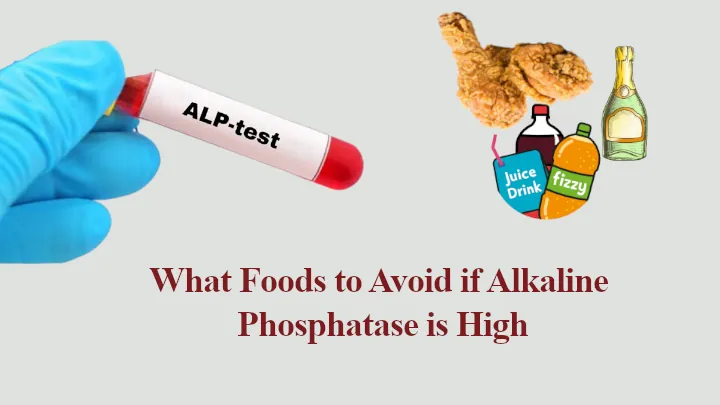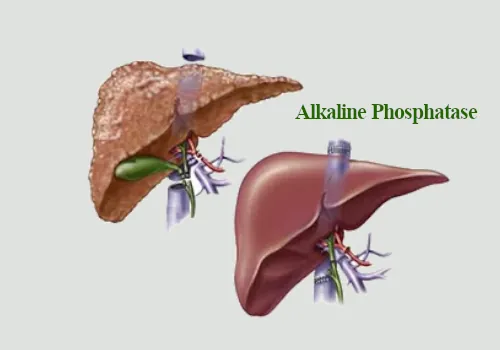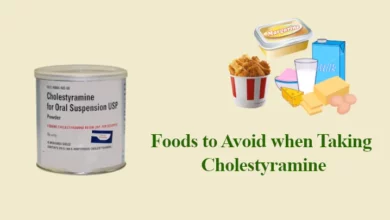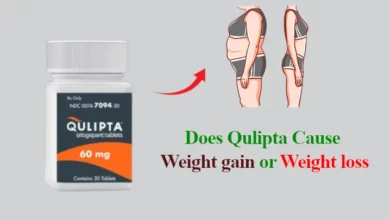What Foods to Avoid if Alkaline Phosphatase is High

Are you looking for what foods to avoid if alkaline phosphatase is high? Alkaline phosphatase is one of the markers and indications that should be monitored to maintain good health. The body contains alkaline phosphatase in various tissues, with the liver, bones, and intestines having the most considerable amounts. It is essential for several physiological functions, such as liver function, nutrition absorption, and bone mineralization.
When alkaline phosphatase levels elevate, it can indicate underlying health concerns like liver disease, bone disorders, or certain metabolic conditions.
While diet alone won’t necessarily lower the enzyme levels directly, making healthy food choices can help support overall liver health and potentially contribute towards maintaining optimal enzyme levels.
In this article, we will look at what foods to avoid if alkaline phosphatase is high:
In This Article
What Foods to Avoid if Alkaline Phosphatase is High

If your alkaline phosphatase levels are high, there are certain foods you should avoid in order to keep your levels under control. Here we have listed what foods to avoid if alkaline phosphatase is high:
1. High-fat Dairy Products
High-fat dairy products should be avoided if alkaline phosphatase levels are high due to their potential impact on liver health.
Alkaline phosphatase is an enzyme produced in various tissues, including the liver, and elevated levels can indicate dysfunction or damage.
Overeating full-fat milk, cheese, or cream could lead to fatty liver disease, which is associated with inflammation and impaired function, which could cause higher alkaline phosphatase levels.
2. Fried foods
Fried foods can be delicious and tempting, but it’s important to remember that these dishes are typically deep-fried in unhealthy oils that can contain high levels of saturated and trans fats.
Overeating unhealthy fat has been linked to inflammation as well as liver dysfunction. This could lead to impaired liver function, which affects the production and regulation of enzymes like alkaline phosphatase.
3. Alcohol consumption
It’s essential to be aware of the impact that excessive alcohol consumption can have on our liver health. High levels of alkaline phosphatase in our blood can indicate damage or disease in the liver, which produces this enzyme and many others. Let’s remember to take care of ourselves by drinking responsibly!
4. High-sodium foods
High-sodium foods are not directly associated with alkaline phosphatase levels, but limiting sodium intake for overall health and well-being is still essential.
Elevated alkaline phosphatase levels can indicate various conditions, such as liver disease or cancer, so it is best to take preventive measures when possible.
Excessive sodium intake may indirectly contribute by causing hypertension (high blood pressure) or fluid retention, which could affect liver health.
5. Red meat
Recent studies have shown that consuming too much red meat, particularly fatty cuts, and processed meats, has been associated with an increased risk of liver diseases such as non-alcoholic fatty liver disease (NAFLD) and inflammation. This could lead to elevated alkaline phosphatase levels, which indicate damage or dysfunction in the liver.
6. Certain vegetables
Certain vegetables contain compounds called oxalates. Oxalates are naturally occurring substances found in many plant-based foods, and they can affect alkaline phosphatase levels in some people.
Unfortunately, oxalates can also combine with calcium to form kidney stones or contribute to developing other types of kidney issues.
7. Trans fats
It’s essential to be aware of the potential health risks associated with trans fats. Studies have shown that they can lead to inflammation and liver damage and increases alkaline phosphatase.
It’s generally recommended to avoid them due to their detrimental effects on overall health. You should check labels when shopping for food and try to limit or eliminate foods containing trans fat from your diet.
8. Fatty meats
When alkaline phosphatase levels are high, it can indicate liver or bone disorders. It’s essential to know that fatty meats can contribute to elevated alkaline phosphatase levels.
The liver plays a role in producing this enzyme, and too much fat intake may overburden it. Additionally, inflammation caused by consuming too many fatty foods may disrupt the liver’s function and increase these levels.
9. Refined carbohydrates
Refined carbohydrates like white bread, white rice, pasta, and pastries are quickly digested and can cause a spike in blood sugar levels. This leads to the release of insulin, which promotes inflammation in the body.
Chronic inflammation has been linked to high alkaline phosphatase levels, so it’s best to avoid these refined carbs if your AP levels are elevated.
10. Sugary beverages
I’m sure you’ve heard that sugary beverages are unsuitable for your health, and now there’s a new reason to avoid them if your alkaline phosphatase is high.
While there may not be an obvious link between the two, excessive consumption of these drinks can contribute to various health issues, including liver damage. So it’s best to limit or avoid sugary beverages to maintain optimal liver function and overall health.
11. Processed foods
We all know they can be convenient and tasty, but unfortunately, many are also high in unhealthy fats, sodium, and additives.
These factors can contribute to inflammation and oxidative stress in the body, which is terrible for our liver health and enzyme levels, including alkaline phosphatase.
So it’s best to limit our consumption of fried snacks, packaged baked goods, or processed meats as these contain high levels of trans fats or saturated fats that could potentially damage your liver.
Conclusion
In conclusion, it is essential to pay attention to your food and make specific changes if your alkaline phosphatase levels are high to maintain your overall health and liver function. Several foods are typically advised to be avoided or limited if you have elevated alkaline phosphatase levels.
References
- Relationship between the effects of a high-fat meal and blood group in determination of alkaline phosphatase activity
- Interplay between intestinal alkaline phosphatase, diet, gut microbes and immunity
- The effect of food ingestion on intestinal and serum alkaline phosphatase in rats





